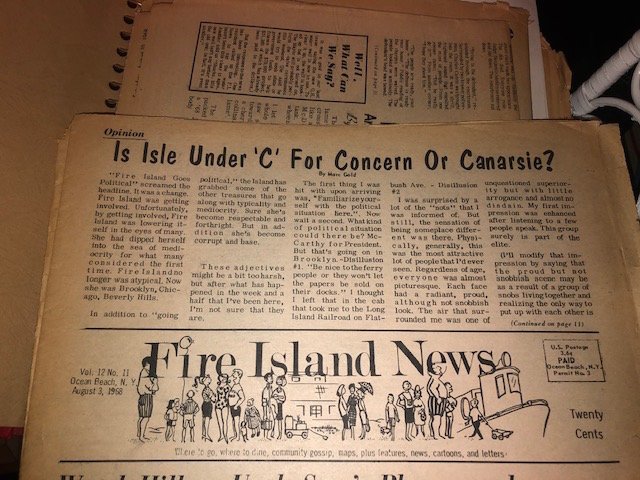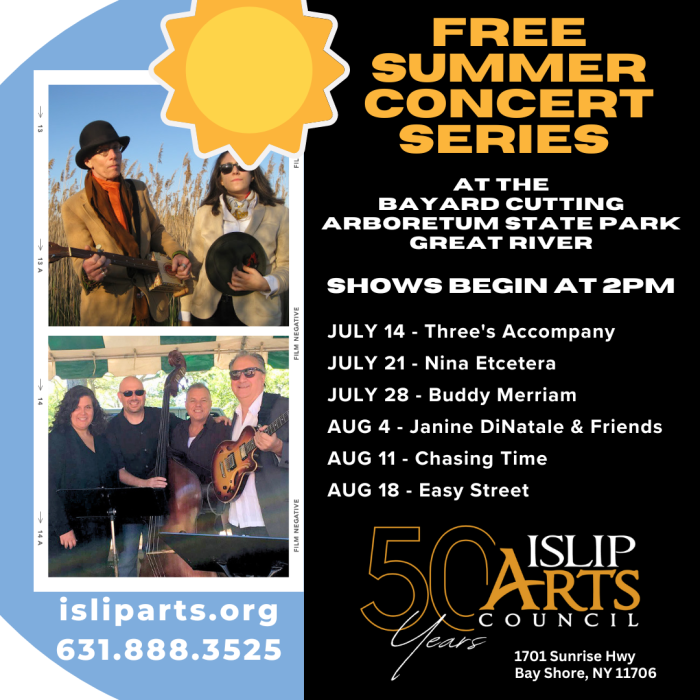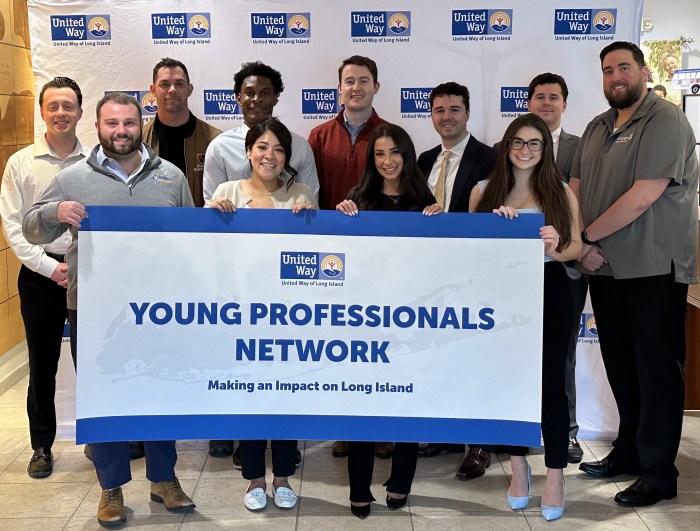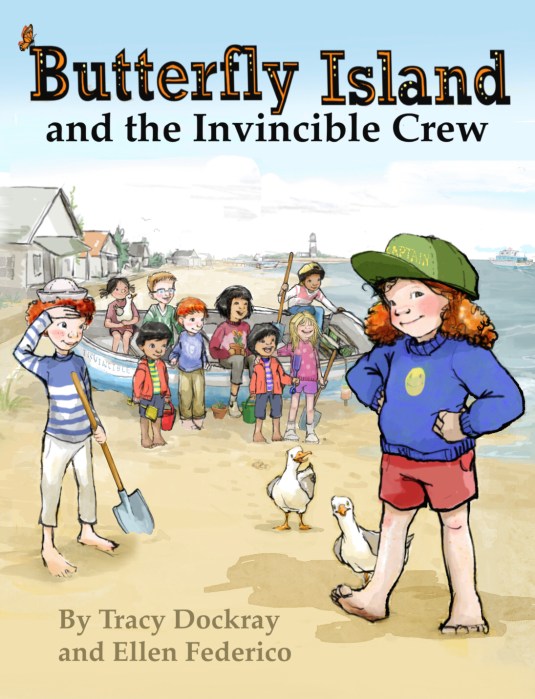 By Marc Gold ~ The wonderful time capsule of music … what would we do without it? I was beginning my daily walking journey in the Staten Island woods at Rivington and Park Drive North, armed with a music set list I was proud of. “My Back Pages,” the Byrds iconic Dylan cover played at top volume. Suddenly I was back in 1968, when I was the associate editor of Fire Island News.It was June prior to the beginning of my junior year at LIU Brooklyn. For some reason I was not in summer school, and I was planning on working (against my will and desire) at Gold’s, our family business. However, I received a call from Stan Fischler the renowned hockey historian. He said his buddy, Jay Garfield Trien, owner and publisher of the Fire Island News, was in a pinch. One of his two staff members had a family emergency and had to give up the job as assistant editor three issues into the summer, leaving the newspaper shorthanded.“Do you want it?” Stan asked.I responded, “I can’t do that … write for a newspaper?”I was five years removed from my last writing experience as editor of the Met Maze, 1962’s official publication of the NY Mets Fan Club. This hardly qualified as writing experience. But I was 20, in need of a summer job, and besides Stan said, “Do it!”When Stan Fischler says do something, you do it. It can only be good. Stan had me writing for the Williamsburg News at 14, writing for the Brooklyn Tech Survey at 15, managing the Tech basketball team at 16, and interning for the NY Journal American at 18. He usually had good advice.I did not have a clue as to what the job entailed when I arrived two days later – nervous, terrified and hungry – in Ocean Beach, Fire Island. I was early for my 2 p.m. appointment with Bea Garfield, Trien’s mother and office manager.It was noon when I arrived after my ferry ride from Bay Shore. With time to spare I decided to go into one of the many bar/restaurants that lined Main Street. I saw signs in the windows proclaiming, “Clams on the half shell, $2.95.” It looked appetizing, although I had no idea as to what they were. I liked baked clams so I thought this was a spin-off of that. Nervously anticipating my meeting, I sat down, looked at the menu and boldly exclaimed to the server, “Clams on the half shell.” Shortly I was stunned into reality as these yucky things were brought over to me. I could barely look at them. Intrepidly, I forced myself to taste one, and it tasted as bad as it looked.This was my first experience on Fire Island. I did not order clams on the half shell again for many years. Subsequently I learned the necessity of putting gobs of horseradish and cocktail sauce on them to make the experience manageable.After my lunch of a single shocking raw clam, I walked to the Fire Island News office and met Mrs. Garfield, who appeared to me as a hard working “no time to waste lady.” I introduced myself and was greeted fairly warmly. Further, she struck me as a sharp speaking, quick talking, super domineering Jewish mother. Of course, I was used to this and handled it easily, as this was my specialty.Bea showed me where my desk was, complete with typewriter and a ream of paper. I was stationed on the right side of the office directly behind hers with another desk to my left. Next to Bea’s was a Western Union telegraph machine. There were some shelves and not much else. The office had a storefront of two ceiling to floor panes of glass where we could see people and bicycles going by at all times. It was quite picturesque. As a child I fantasized about moving to the middle of the country, specifically Kansas City for some reason, it probably had to do with Wilbert Harrison, and working in a newspaper office exactly like this. It was an ideal spot for a 20-year-old who was trying to determine where his life was heading. If I did this right, I would have a start.Bea showed me the back room, which was to be my living quarters. Inside there was a bed, a refrigerator, and a desk with a typewriter. There was also a bathroom and shower outside of my room that was shared with our next door neighbor, a fascinating scarlet-haired-girl who appeared to be my age. It could be wonderful. Here I was in one of the hippest places in the country – Fire Island – with an artsy job as a writer on the beach, and a job that included accommodations! It should be the best six weeks of my life. I wouldn’t have to go to stores trying to sell spare rib sauce, or listen to my terrible uncles while getting up at ungodly hours every day. It was going to be the summer of summers. There were amazing looking girls in sandals wearing outrageous bathing suits. It was June of 1968 and the world was changing. Fire Island was a stanchion of liberal politics, anti-war, anti-draft, abounding with freethinking people.I was overwhelmed by it all, as Bea very nicely told me to settle in. I did so and later that day met the editor of the newspaper, Emmett Murray, a considerate man eight years older than myself. He did not put me under any pressure, treating me as an equal. Emmett was a prolific writer who came into the office rarely, but would always get the job done. He would give me assignments for the week, which started on Friday and ended on Tuesday when the paper would be put to bed. I was off on Wednesday and Thursday, then back at work on Friday morning.There were some great afternoons on Fire Island. I would go to great restaurants and order a beer and a sandwich of some sort. (Not clams on the half shell.) Then I would hit the beach with my transistor radio, totally grooving.Putting the paper to bed was the best time of the week. Invariably I would wait until the last minute to complete my assignments. Then on Tuesday, at about 4 p.m., Emmett and I would take the ferry into Bay Shore where we would pick up a car provided by Bea and drive to have dinner. Then we would go to the printer and set up shop. I sat at a desk with a typewriter, with all of the stories that Emmett and I had written, as well as the various columns provided by writers from each Fire Island community.I proofed every word, although not quite following the Chicago Style Manual of Writing. Never sure about whether the period or quotation marks should end a sentence, I made my own rules, but I followed them.After proofing I would send the final documents to Emmett who would place them into press ready columns. It would then come back to me for a final proof. The final would go to Emmett who stood at a huge table where he would lay out the newspaper page by page. I wrote headlines for my stories and Emmett wrote them for everything else.Once he was satisfied with how the paper would look we would drive back to the parking lot near the ferry. As it was well after midnight the ferry was no longer running, necessitating a water taxi back to Ocean Beach.Wednesday morning was incredibly exciting as I eagerly anticipated seeing the finished newspaper. There was my name by-lined throughout and listed on the masthead as the Associate Editor. I was so pleased with myself.The summer ended and I went home. During the winter of 1968, I received a call from Bea Garfield asking if I would come back in 1969, but I had summer school to attend and I declined. It was the regret of my life.I was now back on my walk as the Temptations’ “I Wish it Would Rain,” played. I could not make the song loud enough.
By Marc Gold ~ The wonderful time capsule of music … what would we do without it? I was beginning my daily walking journey in the Staten Island woods at Rivington and Park Drive North, armed with a music set list I was proud of. “My Back Pages,” the Byrds iconic Dylan cover played at top volume. Suddenly I was back in 1968, when I was the associate editor of Fire Island News.It was June prior to the beginning of my junior year at LIU Brooklyn. For some reason I was not in summer school, and I was planning on working (against my will and desire) at Gold’s, our family business. However, I received a call from Stan Fischler the renowned hockey historian. He said his buddy, Jay Garfield Trien, owner and publisher of the Fire Island News, was in a pinch. One of his two staff members had a family emergency and had to give up the job as assistant editor three issues into the summer, leaving the newspaper shorthanded.“Do you want it?” Stan asked.I responded, “I can’t do that … write for a newspaper?”I was five years removed from my last writing experience as editor of the Met Maze, 1962’s official publication of the NY Mets Fan Club. This hardly qualified as writing experience. But I was 20, in need of a summer job, and besides Stan said, “Do it!”When Stan Fischler says do something, you do it. It can only be good. Stan had me writing for the Williamsburg News at 14, writing for the Brooklyn Tech Survey at 15, managing the Tech basketball team at 16, and interning for the NY Journal American at 18. He usually had good advice.I did not have a clue as to what the job entailed when I arrived two days later – nervous, terrified and hungry – in Ocean Beach, Fire Island. I was early for my 2 p.m. appointment with Bea Garfield, Trien’s mother and office manager.It was noon when I arrived after my ferry ride from Bay Shore. With time to spare I decided to go into one of the many bar/restaurants that lined Main Street. I saw signs in the windows proclaiming, “Clams on the half shell, $2.95.” It looked appetizing, although I had no idea as to what they were. I liked baked clams so I thought this was a spin-off of that. Nervously anticipating my meeting, I sat down, looked at the menu and boldly exclaimed to the server, “Clams on the half shell.” Shortly I was stunned into reality as these yucky things were brought over to me. I could barely look at them. Intrepidly, I forced myself to taste one, and it tasted as bad as it looked.This was my first experience on Fire Island. I did not order clams on the half shell again for many years. Subsequently I learned the necessity of putting gobs of horseradish and cocktail sauce on them to make the experience manageable.After my lunch of a single shocking raw clam, I walked to the Fire Island News office and met Mrs. Garfield, who appeared to me as a hard working “no time to waste lady.” I introduced myself and was greeted fairly warmly. Further, she struck me as a sharp speaking, quick talking, super domineering Jewish mother. Of course, I was used to this and handled it easily, as this was my specialty.Bea showed me where my desk was, complete with typewriter and a ream of paper. I was stationed on the right side of the office directly behind hers with another desk to my left. Next to Bea’s was a Western Union telegraph machine. There were some shelves and not much else. The office had a storefront of two ceiling to floor panes of glass where we could see people and bicycles going by at all times. It was quite picturesque. As a child I fantasized about moving to the middle of the country, specifically Kansas City for some reason, it probably had to do with Wilbert Harrison, and working in a newspaper office exactly like this. It was an ideal spot for a 20-year-old who was trying to determine where his life was heading. If I did this right, I would have a start.Bea showed me the back room, which was to be my living quarters. Inside there was a bed, a refrigerator, and a desk with a typewriter. There was also a bathroom and shower outside of my room that was shared with our next door neighbor, a fascinating scarlet-haired-girl who appeared to be my age. It could be wonderful. Here I was in one of the hippest places in the country – Fire Island – with an artsy job as a writer on the beach, and a job that included accommodations! It should be the best six weeks of my life. I wouldn’t have to go to stores trying to sell spare rib sauce, or listen to my terrible uncles while getting up at ungodly hours every day. It was going to be the summer of summers. There were amazing looking girls in sandals wearing outrageous bathing suits. It was June of 1968 and the world was changing. Fire Island was a stanchion of liberal politics, anti-war, anti-draft, abounding with freethinking people.I was overwhelmed by it all, as Bea very nicely told me to settle in. I did so and later that day met the editor of the newspaper, Emmett Murray, a considerate man eight years older than myself. He did not put me under any pressure, treating me as an equal. Emmett was a prolific writer who came into the office rarely, but would always get the job done. He would give me assignments for the week, which started on Friday and ended on Tuesday when the paper would be put to bed. I was off on Wednesday and Thursday, then back at work on Friday morning.There were some great afternoons on Fire Island. I would go to great restaurants and order a beer and a sandwich of some sort. (Not clams on the half shell.) Then I would hit the beach with my transistor radio, totally grooving.Putting the paper to bed was the best time of the week. Invariably I would wait until the last minute to complete my assignments. Then on Tuesday, at about 4 p.m., Emmett and I would take the ferry into Bay Shore where we would pick up a car provided by Bea and drive to have dinner. Then we would go to the printer and set up shop. I sat at a desk with a typewriter, with all of the stories that Emmett and I had written, as well as the various columns provided by writers from each Fire Island community.I proofed every word, although not quite following the Chicago Style Manual of Writing. Never sure about whether the period or quotation marks should end a sentence, I made my own rules, but I followed them.After proofing I would send the final documents to Emmett who would place them into press ready columns. It would then come back to me for a final proof. The final would go to Emmett who stood at a huge table where he would lay out the newspaper page by page. I wrote headlines for my stories and Emmett wrote them for everything else.Once he was satisfied with how the paper would look we would drive back to the parking lot near the ferry. As it was well after midnight the ferry was no longer running, necessitating a water taxi back to Ocean Beach.Wednesday morning was incredibly exciting as I eagerly anticipated seeing the finished newspaper. There was my name by-lined throughout and listed on the masthead as the Associate Editor. I was so pleased with myself.The summer ended and I went home. During the winter of 1968, I received a call from Bea Garfield asking if I would come back in 1969, but I had summer school to attend and I declined. It was the regret of my life.I was now back on my walk as the Temptations’ “I Wish it Would Rain,” played. I could not make the song loud enough.  Marc Gold remains active in growing Gold’s Pure Foods LLC., the company founded by his family that is renowned for their horseradish, mustard, and other condiments. He and his wife, Rosalie, are the proud parents of a daughter, Taryn, and a son, Shaun. Marc and Shaun now collaborate on their company’s partnerships with major sport venues. Marc also presently avails himself to consulting work and public speaking engagements. He can be reached at marcusngold@gmail.com.
Marc Gold remains active in growing Gold’s Pure Foods LLC., the company founded by his family that is renowned for their horseradish, mustard, and other condiments. He and his wife, Rosalie, are the proud parents of a daughter, Taryn, and a son, Shaun. Marc and Shaun now collaborate on their company’s partnerships with major sport venues. Marc also presently avails himself to consulting work and public speaking engagements. He can be reached at marcusngold@gmail.com.































